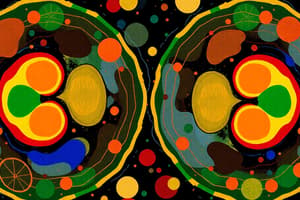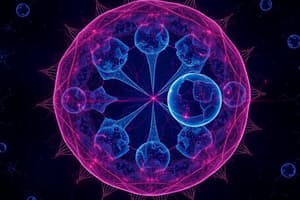Podcast
Questions and Answers
What is the primary purpose of the G1 and G2 phases in the cell cycle?
What is the primary purpose of the G1 and G2 phases in the cell cycle?
- To activate checkpoint proteins for cell cycle progression
- To divide the cell's DNA between daughter cells
- To synthesize proteins required for cytokinesis
- To prepare the cell for replication and division (correct)
During which stage of the cell cycle does DNA replication occur?
During which stage of the cell cycle does DNA replication occur?
- G1 phase
- M phase
- G2 phase
- S phase (correct)
What is the role of checkpoint proteins in the cell cycle?
What is the role of checkpoint proteins in the cell cycle?
- To initiate cell division at the end of the G2 phase
- To promote DNA replication during the S phase
- To ensure that cytokinesis occurs without complication
- To regulate passing through the phases of the cell cycle (correct)
What observation is true regarding the cleavage furrow during cytokinesis in animal cells?
What observation is true regarding the cleavage furrow during cytokinesis in animal cells?
What can lead a cell to enter the G0 state during the cell cycle?
What can lead a cell to enter the G0 state during the cell cycle?
Which of the following accurately describes cytokinesis in plant cells?
Which of the following accurately describes cytokinesis in plant cells?
Which statement correctly differentiates mitosis from meiosis?
Which statement correctly differentiates mitosis from meiosis?
What happens to epithelial cells in rapidly dividing tissues?
What happens to epithelial cells in rapidly dividing tissues?
Flashcards are hidden until you start studying
Study Notes
Mitosis and Meiosis
- Mitosis is a type of cell division that results in two daughter cells that are genetically identical to the parent cell.
- Meiosis is a type of cell division that results in four daughter cells that are genetically different from the parent cell.
The Cell Cycle
- The cell cycle is a series of events that take place in a cell leading to its division and duplication of its DNA (DNA replication).
- The cell cycle consists of four main phases: G1, S, G2, and M.
- Interphase is the period of time between cell divisions, where the cell grows and replicates its DNA. Interphase consists of G1, S and G2 phases.
- G1 phase (first gap) Cell grows and synthesizes proteins and organelles necessary for replication.
- S phase (synthesis) The cell replicates its DNA.
- G2 phase (second gap) Cell continues to grow and produces proteins necessary for cell division.
- M Phase (mitosis) The cell divides its replicated DNA and its cytoplasm, resulting in two daughter cells that have the same number of chromosomes as the parent cell.
- G0 phase A cell that is not actively dividing and is in a resting state.
Cytokinesis
- Cytokinesis is the physical process of cell division, where the cytoplasm of a cell divides to form two daughter cells.
- In animal cells, cytokinesis occurs by the formation of a cleavage furrow which pinches in, dividing the cell into two.
- In plant cells, cytokinesis occurs by the formation of a cell plate, which grows from the center of the cell outwards, dividing it into two.
Control of the Cell Cycle
- Cell cycle length can vary greatly depending on the type of cell.
- Rapidly dividing cells have a shortened G1 phase, meaning they spend less time preparing for replication.
- Non-dividing cells get stuck in the G0 phase, a resting state where they do not divide.
- External factors such as environmental conditions and signaling molecules (e.g., hormones) can influence the cell cycle.
- Internal factors such as cell cycle control molecules and checkpoints also play a role in regulating the cell cycle.
Checkpoint Proteins
- Cyclins and cyclin-dependent kinases (cdks) are proteins that regulate the progression of the cell cycle.
- Checkpoints are control points that monitor the cell cycle and ensure that each stage is completed correctly before proceeding to the next stage.
Studying That Suits You
Use AI to generate personalized quizzes and flashcards to suit your learning preferences.





